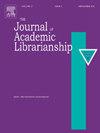Digital services as catalysts for lifelong learning in Thai higher education institutions
IF 2.3
3区 管理学
Q2 INFORMATION SCIENCE & LIBRARY SCIENCE
引用次数: 0
Abstract
As lifelong learning gains increasing importance in higher education, this study explores the role of digital services in helping Thai universities establish effective learning environments and support systems for skill development. Using a quantitative research approach, data were collected through an online questionnaire targeting faculty members and program chairpersons, resulting in 224 valid responses for analysis. The findings reveal that respondents place high value on a wide range of library, educational, and IT/media services, especially those related to research support, digital resources, e-learning, and technology-enhanced learning, highlighting their essential contribution to cultivating lifelong learning skills. Key services such as wireless internet access, educational software, and collaborative learning spaces were particularly emphasized. While emerging technologies like virtual and augmented reality were seen as promising, their current usage remains limited. The study also notes strong support for integrating digital services into university curricula, with particular attention given to embedding these tools into learning strategies and management systems. Approaches such as collaboration with library staff and the use of e-portfolios were moderately endorsed, reflecting recognition of their value despite lower implementation levels. The results suggest that lecturers should embed digital services in their teaching and assessment practices to enhance learning outcomes. Students are likewise encouraged to actively engage with these technologies to boost their lifelong learning capacities, academic achievement, and personal growth. Meanwhile, universities are urged to play a proactive role by incorporating digital services into curriculum development and ensuring the availability of necessary resources to support continuous student learning.
数字服务是泰国高等教育机构终身学习的催化剂
随着终身学习在高等教育中的重要性日益增加,本研究探讨了数字服务在帮助泰国大学建立有效的学习环境和技能发展支持系统方面的作用。采用定量研究方法,通过针对教师和项目主席的在线问卷收集数据,产生224个有效回复进行分析。调查结果显示,受访者高度重视图书馆、教育和IT/媒体服务,特别是与研究支持、数字资源、电子学习和技术增强学习相关的服务,强调了它们对培养终身学习技能的重要贡献。特别强调了无线互联网接入、教育软件和协作学习空间等关键服务。虽然虚拟现实和增强现实等新兴技术被视为很有前途,但它们目前的使用仍然有限。该研究还指出,大力支持将数字服务纳入大学课程,并特别关注将这些工具纳入学习策略和管理系统。与图书馆工作人员合作和使用电子档案等方法得到了适度的认可,反映出尽管实施水平较低,但对其价值的认可。研究结果表明,教师应在教学和评估实践中嵌入数字服务,以提高学习成果。同样,鼓励学生积极参与这些技术,以提高他们的终身学习能力,学术成就和个人成长。同时,敦促大学发挥积极作用,将数字服务纳入课程开发,并确保提供必要的资源,以支持学生的持续学习。
本文章由计算机程序翻译,如有差异,请以英文原文为准。
求助全文
约1分钟内获得全文
求助全文
来源期刊

Journal of Academic Librarianship
INFORMATION SCIENCE & LIBRARY SCIENCE-
CiteScore
5.30
自引率
15.40%
发文量
120
审稿时长
29 days
期刊介绍:
The Journal of Academic Librarianship, an international and refereed journal, publishes articles that focus on problems and issues germane to college and university libraries. JAL provides a forum for authors to present research findings and, where applicable, their practical applications and significance; analyze policies, practices, issues, and trends; speculate about the future of academic librarianship; present analytical bibliographic essays and philosophical treatises. JAL also brings to the attention of its readers information about hundreds of new and recently published books in library and information science, management, scholarly communication, and higher education. JAL, in addition, covers management and discipline-based software and information policy developments.
 求助内容:
求助内容: 应助结果提醒方式:
应助结果提醒方式:


